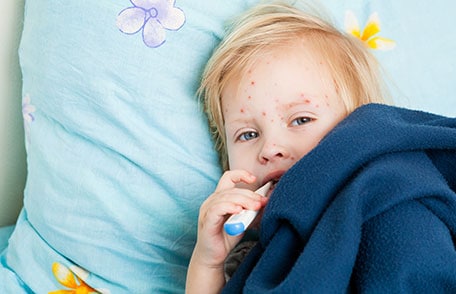Chickenpox Can Be Serious

Most children who get chickenpox recover completely. But chickenpox can be serious, even deadly, especially for babies, adolescents, adults, pregnant women, and people with a weakened immune system. Make sure everyone in your family is up to date on their chickenpox vaccine.
Chickenpox vaccine is the best way to protect you and your family from chickenpox. Two doses provide the best protection against the disease.
CDC recommends:
- Children get the first dose of chickenpox vaccine at 12 through 15 months old and the second dose at age 4 through 6 years.
- People 13 years of age and older who have never had chickenpox or been vaccinated should get two doses of chickenpox vaccine at least 28 days apart.
If you or your child only got one dose in the past, check with your doctor about getting a second dose.
Chickenpox Symptoms
Classic chickenpox symptoms are—
- Red, itchy rash that usually starts on the face, chest, and back, and then spreads to the rest of the body
- Fluid-filled blisters, resulting from the rash, that usually crust over in 4-7 days
Chickenpox Vaccine is Safer than Getting Chickenpox
Two doses of chickenpox vaccine are very effective at preventing disease, including severe disease, complications, and death. Some people who have been vaccinated against chickenpox can still get the disease. However, the symptoms are usually milder with fewer blisters and mild or no fever, and shorter duration of illness.
Also, when you get vaccinated, you protect others in your community. This is especially important for people who cannot get vaccinated. People who cannot get the chickenpox vaccine include babies younger than 1 year, pregnant women, and those with a weakened immune system. Learn more about who should not get chickenpox vaccine.
Paying for Chickenpox Vaccine
Most health insurance plans cover the cost of vaccines. However, you may want to check with your insurance provider before going to the doctor. If you don’t have health insurance or if your insurance does not cover vaccines for your child, the Vaccines for Children (VFC) Program may be able to help. This program helps families of eligible children who might not otherwise have access to vaccines. To learn more, visit the VFC website or ask your child’s doctor. You can also contact your state VFC coordinator.
If you have any questions about chickenpox or the vaccine, talk with your doctor.
More Information
To learn more about chickenpox and vaccination, visit:
- CDC Chickenpox Website
- Chickenpox Fact Sheet for Parents
- Chickenpox Vaccination
- Chickenpox Vaccine Information Sheet (VIS)
- Two Options for Protecting Your Child Against Measles, Mumps, Rubella, and Varicella
- CDC Podcast: Chickenpox – What You Need to Know [Podcast – 4:06]
- Chickenpox-related Information for Travelers


































No hay comentarios:
Publicar un comentario